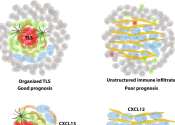Newly discovered mechanism helps tumor cells evade the immune system early on
Tumors actively prevent the formation of immune responses by cytotoxic T cells, which are essential in combating cancer. Researchers at the Technical University of Munich (TUM) and the Ludwig-Maximilians-Universität München ...
Apr 24, 2024
0
4









